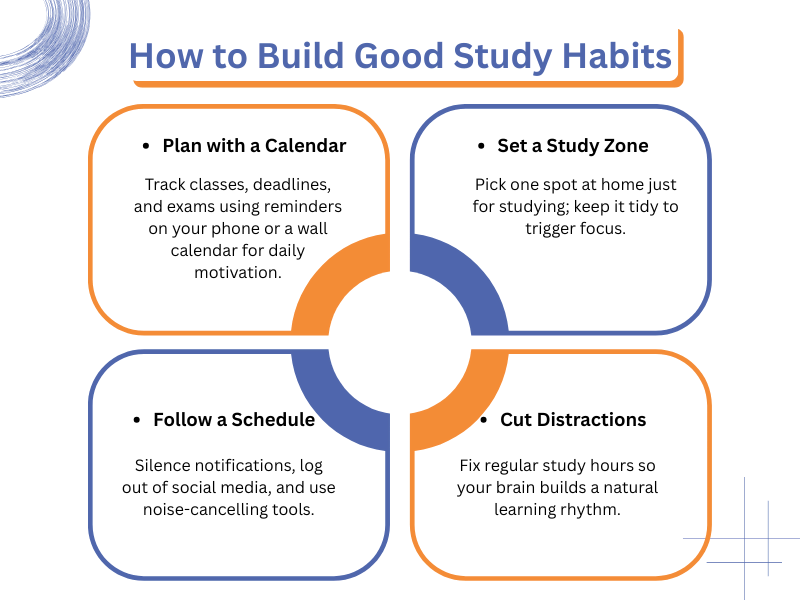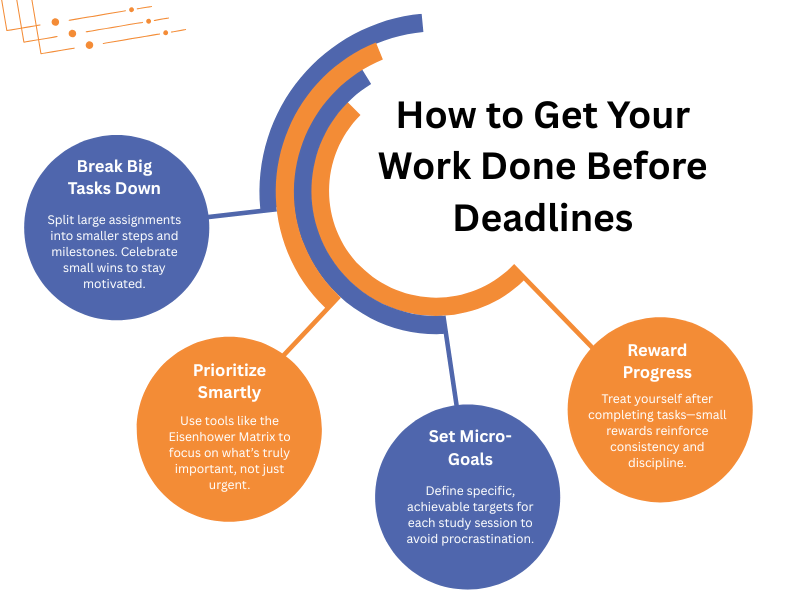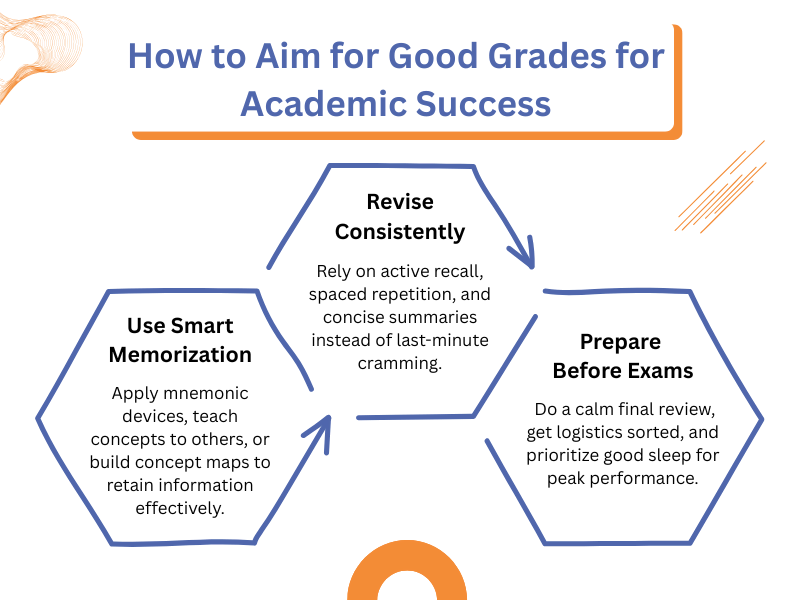Does the study feel like a never-ending burden? Is completing one assignment task causing your burnout? The lack of motivation can be a major reason behind this. Many students feel the same way when it comes to online learning.
While virtual education supports distance learning from home, it also lacks the element of immediate accountability. Asynchronous online degree programs especially allow online learners to study at their own pace. However, since a professor is not physically present, students often struggle to stay on track. Procrastination and other distractions are also some prime reasons why students fall behind. prompting some to even search for services to take my online class for me for them.
But you have no other option than staying productive. After all, academic success depends on hard work, and good grades demand focus and an effective study strategy. In this guide, we will share tips and strategies for how to Stay Motivated During Online Classes.
Table of Contents
ToggleHow Can You Stay Motivated During Online Classes?
Here are some useful online class motivation tips that will help you cope with procrastination and improve your focus:
Build Good Study Habits for Intrinsic Motivation
Building good study habits to stay motivated when learning is not as scary as it sounds. Just follow these simple rules for at least one month, and you will soon see the difference:

Rule No.1: Create a Calendar
Start with the basics! Review your syllabus. Then, mark what’s completed and what’s pending. Next, jot down important dates for exams, regular online classes, assignment submissions, weekly quizzes, and homework deadlines.
You can use the calendar of the Learning Management System if you wish. Alternatively, add them to your phone’s calendar with reminders.
If you prefer simplicity, write them on paper. In fact, you can keep them visible on your study table wall. Seeing these reminders daily will give you a gentle push to stay consistent. Furthermore, this will build steady momentum in your study routine.
Rule No.2: Designate Your ‘Classroom’ at Home
Your brain associates places with activities. One of the common mistakes in online classes is not having a designated study space. A specific desk or even a corner of a room should be dedicated only for studying.
Also, keep it clean, organized, and equipped with everything you need. This simple act creates a powerful psychological cue that when you’re in that space, it’s time to focus.
Rule No.3: Master Time Management
A journey of Motivated online learning starts with good time management. First of all, set aside a fixed time for your study sessions. Following a fixed timetable helps your brain pick up the habit. Your brain will automatically send you a signal that “it’s time to study”.
Furthermore, having a fixed schedule also saves you time for other life commitments and hobbies. You will complain less and stay productive more!
Rule No.4: Block the Distractions to Stay Motivated During Online Classes
We understand that keeping gadgets out of the room while studying is impossible, as the entire education is online. But using your phone, laptop, or tablet responsibly during learning should be your priority.
During your fixed study time, make sure you check all these boxes to keep distractions away:
- Log out of social media apps (Facebook, Instagram, X, etc.)
- Tell your roommates or parents not to disturb you during the specific time.
- Use noise-cancellation earbuds.
- Keep the notifications off.
Start Getting Your Work Done before Deadlines
If you have built good study habits by following the basic rules, consider that you have already won half the battle. But to intensify your focus on online classes a bit more, you need to experience the feeling of accomplishment!
You can start small, like having completed assignments before the deadline! Doesn’t that sound amazing? These tips will help you maintain this academic continuity. Also, getting work done on time minimizes last-minute panic and builds confidence for tackling more complex future assignments.

Rule no.1: Breaking Down Large Tasks
Large, complex assignments can feel overwhelming, often leading to procrastination. Breaking down your coursework into smaller, more manageable pieces makes the work less intimidating and easier to start. Here are some online education tips:
Begin by listing every step you can think of required to complete the project. Don’t worry about the order at first; just get all the tasks out of your head and onto paper.
Assign specific blocks of time in your calendar for each small task. After four sessions, take a break. This is a perfect opportunity to get up and walk around the block to clear your head before tackling the next task.
Break your project into major phases or milestones. For a significant piece of coursework like a lab report, milestones could be:
- Background Research
- Conducting the Experiment
- Data Analysis
- Writing the Report
- Final Review
Celebrating the completion of each milestone can provide a sense of accomplishment and keep you motivated to reach your goals. You can also take professional guidance, such as Take my online class For me services, to get help.
Rule No.2: Prioritize What’s Important
Knowing how to prioritize is critical for managing your time effectively and reducing stress. It involves distinguishing between what is urgent and what is truly important. Productive online students choose to use the Eisenhower Matrix often. This tool helps you categorize tasks based on urgency and importance, allowing you to focus on what really matters. You divide your tasks into quadrants:
- Urgent & Important (Do First): These tasks have immediate deadlines.
- Not Urgent & Important (Schedule): These tasks contribute to your long-term goals but don’t have a pressing deadline. This is where you should be spending time proactively to avoid future crises.
- Urgent & Not Important (Delegate or Minimize): These tasks demand immediate attention but don’t contribute significantly to your goals.
Rule No.3: Set Clear Goals for Each Session
Vague goals like “study biology” lead to procrastination. Instead, set hyper-specific “micro-goals” for each study block. For example: “Read Chapter 5 and define 10 key terms” or “Complete 15 practice problems.” This provides a clear target and delivers a small hit of accomplishment every time you finish one.
Rule No.4: Reward Yourself
Rewarding yourself after completing tasks is a motivational tool! By creating positive associations with your hard work, you reinforce good study habits. The reward doesn’t have to be extravagant; it can be as simple as watching an episode of your favorite show, enjoying a snack, or taking a relaxing bath.
Aim for Good Grades for Academic Success
Working toward getting better grades is the ultimate motivation for online students. Excelling in one semester with impressive grades pushes you to do better in the next. You will gladly take the pressure to outperform your fellow students and become the rising star in the classroom. Virtual learning tips to achieve good grades:

1. Tips to Implement Effective Memorization Techniques
You will need more specialized tools for courses that require memorizing specific facts, dates, or terminology. For these situations, implement the following memorization techniques:
- Use Mnemonic Devices: To start, create memorable acronyms, rhymes, or silly sentences to remember lists or processes.
- Try the “Teach-It” Method: Furthermore, one of the best ways to ensure you understand and remember something is to try explaining it to someone else in simple terms. Essentially, if you can teach it, you know it.
- Create Concept Maps: Finally, work on visually connecting ideas. Start with a central topic and draw branches to related concepts, definitions, and examples. As a result, this helps you see the bigger picture and how different pieces of information relate to each other.
2. Master Your Revision Techniques
Consistent review is more effective than last-minute cramming. Integrate these habits into your weekly routine:
- Active Recall: Rather than passively re-reading your notes, engage your brain differently. Close your textbook and actively try to recall key concepts from memory. After that, write down everything you can remember about a topic, and then check your materials to see what you missed. Consequently, this process builds stronger neural pathways for memory.
- Spaced Repetition: Instead of reviewing a topic once for five hours, review it five times for one hour over several days. This technique leverages the psychological spacing effect. This confirms that we learn more effectively when study sessions are spaced out.
- Summarize and Highlight: After each lecture or module, create a one-page summary sheet. As you check materials, highlight only the most critical information. This may include key definitions, formulas, and main arguments. This generally creates a concise study guide for your final review.
3. What to Do One Night Before Exams
When the day finally arrives, remember that the 24 hours before a test are critical. Above all, your goal should be to feel rested and confident, not panicked.
- Don’t Cram New Information: Critically, your focus one night before exams should be on review, not learning new topics. Trying to absorb new material at this late stage will likely increase anxiety and interfere with what you already know.
- Do a Final, Quick Review: Instead, spend an hour or two calmly going over your summary sheets, flashcards, or highlighted notes. Think of this as a final warm-up for your brain.
- Prepare Your Logistics: Also, make sure you confirm the exam time, charge your laptop, check your internet connection, and have any permitted materials ready to go. Reducing logistical stress allows you to focus solely on the test itself.
Prioritize Sleep: Most importantly, do not pull an all-nighter. Sleep is absolutely essential for memory consolidation. Indeed, a full night’s rest will do far more for your grade than a few extra hours of frantic, last-minute studying.
Connect with Other Brilliant Classmates
Surrounding yourself with hardworking and motivated classmates can inspire you to aim higher and help you stay motivated during online classes. Reconsider your circle; bad influences often lead to poor academic performance, while a positive circle may help you out of a crisis and push you to improve. Productive friendships can become powerful study support.

Build a Support System with Peers and Professors
Your section on connecting with classmates is great, but don’t forget your instructors. They are your most valuable resource. Attend virtual office hours to ask questions. A quick, polite email to clarify a concept shows you’re engaged and makes you feel more connected to the class, increasing your sense of accountability.
Prioritize Your Physical Well-Being
You cannot have mental focus without physical energy. This isn’t just about getting sleep the night before an exam; it’s about a consistent routine. Ensure you are taking short breaks to stretch or walk, staying hydrated, and maintaining a regular sleep schedule. Think of your physical and mental health not as a separate activity, but as the fuel your brain needs to perform well.
Conclusion
In conclusion, staying motivated during online classes may feel overwhelming at times; however, with the right strategies, it becomes manageable. First, build consistent study habits and, next, manage your time wisely. Furthermore, block distractions and, in addition, surround yourself with positive peers who uplift your progress. Finally, celebrate small wins and set realistic goals. Therefore, with discipline and persistence, you can not only excel academically but also achieve long-term personal growth.
Frequently Asked Questions
1. Why do students lack motivation in online learning?
They often struggle due to isolation, lack of accountability, distractions at home, and the absence of immediate feedback or peer interaction.
2. How do you stay motivated working in a virtual setting?
Set clear goals, create a distraction-free space, use time blocks for focus, and reward yourself after completing tasks to maintain consistency.
3. What is an inspirational quote about online learning?
“Online learning isn’t about where you sit, but how far you’re willing to go.”
4. What is the biggest challenge for students with online learning?
The greatest challenge is staying disciplined without direct supervision while balancing personal responsibilities and digital distractions.

